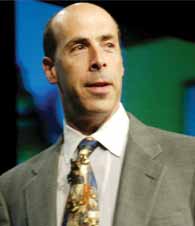|
Executive Interviews: Interview with Rob Jolles on Executive Development
October 2007
-
By Dr. Nagendra V Chowdary
 Rob Jolles
Rob Jolles President of Jolles Associates Inc., speaker and author 
Thank youSir, for having consented
for this Interview. Effective Executive
congratulates you for your
achievements (two best selling books,
seminars, training programs, etc).
Your personal client list reads like a
"who's who" of Fortune 500
companies. What was the trigger/
motivation for getting into training
and executive education space?
I love to sell, I love to teach, and I love
to perform. The world of training
requires all of these skills. Information
is great, but as Einstein said,
"Creativity is more important than
knowledge." This is not said to say
knowledge isn't important, but the
ability to persuade an audience to
want to learn, and keep their attention
is just as critical. I happen to like
combining all these skills.
|
|
-
Can you please share with our
readers some of your achievements
(especially creating, delivering and
managing Xerox Corporation's highly
touted customer sales training
programs)
I'm quite proud of the work I
performed with Xerox but I think
Xerox taught me more than I taught
them. They are masters at building
processes that are repeatable and
predictable. I'd like to think that one of
my most proud achievements was
taking these processes outside Xerox
and to customers. -
A word about one of your bestselling
book, Customer Centered
Selling?
This book is celebrating it's 10th year on
the shelveshere intheStates. However,
I do have a newbook,Mental Agility
The Path to Persuasion which is a book
dedicated to the implementation of
training. It incorporates over 50
exercises, many of which mirror
exercises taught to improvizational actors, to help people speed up their
ability to think on their feet. -
What lessons do you draw from
your exemplary 15 year career of
motivating, inspiring, and
entertaining executives across the
globe?
"You're as good as your last
presentation." It simply doesn'tmatter
what your qualifications are. To be
successful, you must treat every
speaking opportunity as the most
important presentation of your life. -
Many a times people use
executive education and executive
development in the same parlance.
Are they same or is there any
distinction between these terms. If
they are different, can you please
illustrate the differences? For
instance, is it correct to assume that
executive education programs run
as per business schools' calendar and executive development
programs run as per companies'
requirement?
These are two terms I don't use, and
haven't heard used. I don't think it
would be fair for me to give an
opinion on terms I haven't heard
before. -
For this Interview, we shall be
using, with your permission,
executive development (assuming
the connotations of executive
education are also embedded in this
expression). What is the role and
importance of executive
development programs?
My assumption is you are using the
words, "executive development" as
we would use, "training programs."
As a corporate trainer now ing his
25th year in this industry, I can tell
you that if you are not developing
and training your people, you are falling behind. Proper development
teaches,motivates and inspires those
who attend. It is not a coincidence
that the companies that cut back on
their training almost immediately
suffer motivational issues. Of course
they also seem to fall behind those
they are competing with. -
Companies develop executives in
various ways: by giving them
feedback, coaching, mentoring and
training. As per a McKinsey survey,
48% of human resources
executives said that most
executives think development is
simply a function of t raining
programs. Training programs
however seldom produce great
executives. Therefore, where does
executive development programs
fit in?
It's not the executive development
or training programs that are
failing, it's the implementation of
these programs. In my quarter
century of watching companies get
trained, I'm always stunned at how
much attention they put into
having their people put through
development programs, but no
attention to protecting their
investments, and creating true
cultural changes but focusing on
implementation. This is something
that is near and dear to me. -
Some companies have created
their own development platforms.
First class corporate universities
such as Motorola University and
GE's Crotonville can help create
strong corporate cultures, align
companies with their strategies,
disseminate best practices, build
personal networks, and spur
programs for corporate change.
However, critics say that these are
not the engines that drive the
development of individual
capabilities. They cite informality,
which permeates the learning experience, as a strong impediment
to the desired results. What is your
opinion on such company owned
development initiatives? Do you
advocate all the companies to have
their own facilities? Or is it better
to send the chosen executives to an
identified school for imbibing the
desired outcomes?
My opinion of company owned
development initiatives is they are
almost always colossal failures. I
am sorry to be this blunt, but the
fact is, a lot of money is invested in
these programs and it is wasted
money. Typically, the training is not
taught well, but that's not the real
reason for failure. Those they are
teaching are almost always
disappointed that the company
they are working for did not see fit
to invest in their futures properly.
The perception is that if it's being
taught internally, it is being done to
save money, and not to provide
world class training. So, money is
spent, participants are pulled from
their job, or the field, and they
wind up shutting out the message
they are being taught, and bitter
their time was wasted. Now you
have a company that invested in a
product, trained it's trainers, and
demotivated those who attended.
1.
Training and Development Case Studies
2. ICMR
Case Collection
3.
Case Study Volumes
|
